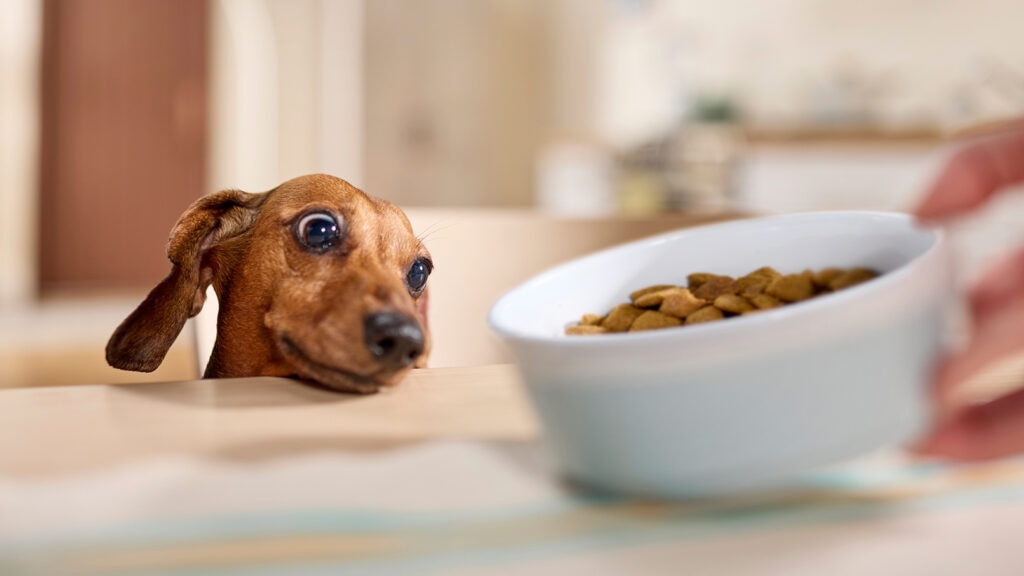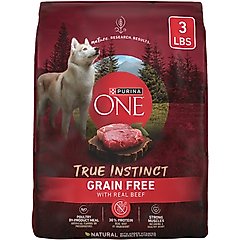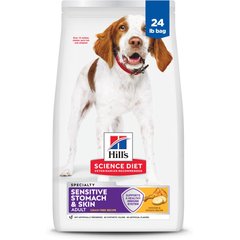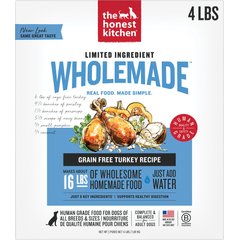What Is Grain-Free Dog Food? Is It Right for My Dog?

Photo by Chewy
Providing good nutrition is essential if a dog is going to be healthy and happy. But with so many dog food options to pick from, how do you know if you’re making good choices?
Let’s look at the pros and cons of an increasingly popular dog diet: grain-free dog food.
Speak with your veterinarian before changing your dog’s diet.
What Is Grain-Free Dog Food?
At the risk of stating the obvious, grain-free dog food does not contain grain. If you look at the ingredient list printed on the pet food label, you should not see wheat, corn, rice, oats, barley, or rye.
But grain-free is not the same as carbohydrate-free. Carbohydrates are an important source of energy for dogs and are a necessary part of dry dog foods. (They help hold the kibble together.) In grain-free dog foods, ingredients like potatoes, sweet potatoes, peas, beans, and lentils are included as sources of carbohydrates.
Another common misconception is that grain-free dog food is also high-protein dog food. This isn’t necessarily the case. Other ingredients (meat and meat meals, for example) play a bigger role in determining a dog food’s protein content. To compare dog food protein levels, look at the guaranteed analysis printed on the pet food label.
Regular Dog Food vs. Grain-Free Dog Food
Here’s a side-by-side comparison of regular dog food vs. grain-free dog food:
| Regular Dog Food | Grain-Free Dog Food | |
|---|---|---|
| Contains Grains | Yes (wheat, rice, oats, etc.) | No. Replaced with peas, lentils, potatoes, sweet potatoes, etc. |
| Commonly Recommended For | Most healthy dogs | Dogs with grain allergies or sensitivities |
| High Protein | May or may not be | May or may not be |
| Associated with Heart Disease | Low chance | Higher chance |
| Cost | Tends to be lower | Tends to be higher |
| Vet-Recommended | Yes | In some cases |
Is Grain-Free Dog Food Good for Dogs?
Some dogs can benefit from eating grain-free dog food, including:
- Dogs with grain allergies: If your dog has a diagnosed food allergy to grains, grain-free dog food can help eliminate the trigger.
- Dogs with other adverse food reactions: Some dogs technically aren’t allergic to grains but still develop an upset stomach after eating them.
Is Grain-Free Dog Food Bad for Dogs?
Feeding a grain-free dog food is also associated with some risks, including:
- Linked to heart disease: Some studies suggest a connection between grain-free diets and dilated cardiomyopathy (DCM).
- May not provide optimal nutrition: Many grain-free dog foods are made by small manufacturers that don’t have a strong background in animal nutrition. At the very least, make sure any grain-free dog food you purchase complies with the Association of American Feed Control Officials (AAFCO) nutritional guidelines.
- High cost: Grain-free dog food is often more expensive than other types of dog food. Don’t pay more than you need to for your dog’s food if that limits your ability to cover their other needs, like unexpected veterinary expenses.
When Is Grain-Free Dog Food Better Than Regular?
What this all boils down to is simple: Grain-free dog food is a better option than regular dog food only if your dog is allergic or sensitive to grains. And even if this is the case, your dog may not have to avoid all grains. For example, if your dog is allergic to wheat, they shouldn’t eat wheat, but they can eat dog foods that contain rice or corn.
And to be clear, grain allergies are not all that common in dogs. In a 2016 study of food allergies in dogs, wheat was only the fifth most common allergen. The top four were beef, dairy, chicken, and lamb.
Do Vets Recommend Grain-Free Dog Food?
So, if your dog has been diagnosed with food allergy, your veterinarian will probably recommend a limited-ingredient diet or hydrolyzed dog food instead of a grain-free dog food.
Most veterinarians do not recommend grain-free dog foods for healthy dogs. In the absence of an adverse food reaction, grain-free dog foods aren’t beneficial, and they have been associated with an increased risk of dilated cardiomyopathy.
What Is the Best Grain-Free Dog Food?
If your dog is allergic or sensitive to grains, you’ll want to pick out the best grain-free dog food for them.
What To Look for in a Grain-Free Dog Food
The best grain-free dog foods have two things in common:
- They provide complete and balanced nutrition and have an AAFCO statement of nutritional adequacy printed on their label.
- They are made by experienced, reputable companies that employ board-certified veterinary nutritionists.
Vet-Recommended Grain-Free Dog Foods
Here are a few grain-free dog foods that meet the criteria mentioned above and are recommended by veterinarians:
- Purina ONE Natural True Instinct Grain-Free with Real Beef Dry Dog Food
- Hill’s Science Diet Adult Sensitive Stomach & Sensitive Skin Grain-Free Chicken & Potato Recipe
- Purina Pro Plan Savor Classic Beef & Chicken Entree Grain-Free Canned Dog Food
- The Honest Kitchen Limited Ingredient Diet Turkey Recipe Grain-Free Dehydrated Dog Food
Recommended Products
Should I Feed My Dog Grain-Free Dog Food?
Always talk to your veterinarian before making a significant change to your dog’s diet, particularly if you are switching to grain-free dog food.
Your vet can help you choose the best food for your dog, and they may recommend increased health monitoring to ensure your dog stays healthy if they are on a grain-free diet.
FAQs About Grain-Free Dog Foods
Q: Do dogs need grain-free food?
A: No, healthy dogs do not need grain-free food. However, it can be beneficial if your dog has a diagnosed allergy or sensitivity to grains.
Q: Is grain-free dog food better than regular dog food?
A: Grain-free dog food is not better than regular dog food. In fact, some grain-free dog foods have been associated with an increased risk of a type of heart disease called dilated cardiomyopathy.
Some grain-free foods may also be formulated by smaller manufacturers that don’t adhere as strictly to AAFCO guidelines, meaning the diet may not be as balanced as regular dog food diets from major manufacturers.
Attributions
This content was medically reviewed by Hannah Hart, DVM, Chewy veterinarian.







